-
ERRATUM01-15-2024
ERRATUM
Revista Brasileira de Enfermagem. 2024;77(1):e2024n1e01
Abstract
ERRATUMERRATUM
Revista Brasileira de Enfermagem. 2024;77(1):e2024n1e01
DOI 10.1590/0034-7167.20247701e01
Views3In the article “The ethics of nursing care for transgender people”, with DOI number: , published in Revista Brasileira de Enfermagem, 2023;76(Suppl 3):e20220797, in authorship: Where it read: […]See more -
01-15-2024
ERRATA
Revista Brasileira de Enfermagem. 2024;77(1):e2024n1e01
Abstract
ERRATA
Revista Brasileira de Enfermagem. 2024;77(1):e2024n1e01
DOI 10.1590/0034-7167.20247701e01
Views1En el artículo “La ética del cuidado de enfermería para personas transgénero”, con número DOI: , publicado en la Revista Brasileira de Enfermagem, 2023;76( Suppl 3):e20220797, en autoría:Onde se lia:[…]See more -
ORIGINAL ARTICLE01-13-2024
Knowledge, Attitudes, and Practices of nurses regarding blood culture collection
Revista Brasileira de Enfermagem. 2024;77(6):e20230424
Abstract
ORIGINAL ARTICLEKnowledge, Attitudes, and Practices of nurses regarding blood culture collection
Revista Brasileira de Enfermagem. 2024;77(6):e20230424
DOI 10.1590/0034-7167-2023-0424
Views2See moreABSTRACT
Objectives:
to investigate the knowledge, attitudes, and practices of nurses regarding blood culture collection.
Methods:
a cross-sectional study was conducted in five Brazilian public hospitals with 112 nurses. Data were collected using an adapted questionnaire and analyzed through descriptive and inferential statistics.
Results:
nurses who did not consider themselves capable of collecting blood cultures had a 72% lower chance of performing the collection at the recommended site and an 83% lower chance of using the same needle for blood inoculation into the vials. Nurses working in the emergency department had a 75% lower chance of knowing the international benchmark for blood culture contamination rates, and those with less than 5 years in the position decreased their chance of accuracy in this matter by 79%.
Conclusions:
there are gaps in the knowledge, attitudes, and practices of nurses regarding blood culture collection. Standardization of the technique, periodic education, supervision and guidance of the collection team, and process auditing are recommended coping strategies.

-
ERRATUM01-13-2024
ERRATUM
Revista Brasileira de Enfermagem. 2024;77(6):e2024n6e08
Abstract
ERRATUMERRATUM
Revista Brasileira de Enfermagem. 2024;77(6):e2024n6e08
DOI 10.1590/0034-7167.20247706e08
Views2In the article “Brazilian nursing specific situation, middle and micro-range theories: a bibliometric study”, with DOI number: , published in Revista Brasileira de Enfermagem, 2024;77(4):e20230520, Chart 1:Where it read:[…]See more -
ORIGINAL ARTICLE01-13-2024
Evaluation of care for people with HIV in Primary Health Care: construct validation
Revista Brasileira de Enfermagem. 2024;77(6):e20230190
Abstract
ORIGINAL ARTICLEEvaluation of care for people with HIV in Primary Health Care: construct validation
Revista Brasileira de Enfermagem. 2024;77(6):e20230190
DOI 10.1590/0034-7167-2023-0190
Views2See moreABSTRACT
Objectives:
to verify the construct validation of an instrument for evaluating care for people living with HIV in Primary Health Care.
Methods:
methodological study carried out in 2021 with 260 health professionals in Recife, PE. Validation based on the internal structure was carried out at this stage using exploratory and confirmatory factor analysis, and validity based on item response theory.
Results:
the validation determined the retention of five factors and 63 items. The instrument’s internal consistency and quality of fit was 0.90, the Tukey-Lewis index was 0.915 and the comparative fit index was 0.918 in the confirmatory factor analysis. The indication for the absolute majority of items is adequate fit.
Conclusions:
the instrument has construct validity, making it possible to use it to evaluate the decentralization process and care for People Living with HIV in Primary Health Care.

-
ERRATUM01-13-2024
ERRATA
Revista Brasileira de Enfermagem. 2024;77(6):e2024n6e07
Abstract
ERRATUMERRATA
Revista Brasileira de Enfermagem. 2024;77(6):e2024n6e07
DOI 10.1590/0034-7167.20247706e06pt
Views2No artigo “Crenças e atitudes de pais ou responsáveis legais sobre a vacinação infantil: revisão de escopo”, com número DOI: , publicado no periódico Revista Brasileira de Enfermagem, 2024;77(4):e20240126, página 5:Onde se lia:[…]See more -
ORIGINAL ARTICLE01-13-2024
Social representations of oncologic surgery for patients with cancer
Revista Brasileira de Enfermagem. 2024;77(6):e20230273
Abstract
ORIGINAL ARTICLESocial representations of oncologic surgery for patients with cancer
Revista Brasileira de Enfermagem. 2024;77(6):e20230273
DOI 10.1590/0034-7167-2023-0273
Views2See moreABSTRACT
Objectives:
to analyze the social representations of patients with cancer regarding oncologic surgery.
Methods:
a qualitative study based on Social Representation Theory was conducted with 126 participants between October 2021 and May 2022 in a public hospital in Rio de Janeiro. A characterization questionnaire, free evocations of the inducing term “surgery”, and semi-structured interviews with 60 participants were applied. Data were analyzed using Microsoft Excel® and IRaMuTeQ.
Results:
the central core of the representation is composed of fear, cure, hope, and removing the disease. The analysis of interviews resulted in six classes that highlight the social changes caused by treatment as well as the need for a support network to cope with the surgical process.
Final Considerations:
the representations reflect fear and hope towards the procedure and the desire to remove the disease, thus translating the cure through surgery.

-
ORIGINAL ARTICLE01-13-2024
Nurses’ perspectives on the use of telemonitoring in the management of people with diabetes and hypertension
Revista Brasileira de Enfermagem. 2024;77(6):e20230481
Abstract
ORIGINAL ARTICLENurses’ perspectives on the use of telemonitoring in the management of people with diabetes and hypertension
Revista Brasileira de Enfermagem. 2024;77(6):e20230481
DOI 10.1590/0034-7167-2023-0481
Views3See moreABSTRACT
Objectives:
to understand the perspective of nurses on the use of telemonitoring in the management of people with type 2 diabetes mellitus and arterial hypertension in primary care.
Methods:
this qualitative research involved sixteen nurses from eight municipalities in Paraná. Data were collected between November 2022 and January 2023 through inperson or remote interviews, which were audio-recorded and subjected to content analysis.
Results:
according to the nurses, telemonitoring enhances users’ knowledge about these conditions, communication and connection with the team, and productivity. However, the lack of electronic resources and equipment, high staff turnover, low user adherence, and the limited availability of professional time present significant challenges.
Final Considerations:
the effective implementation and operation of telemonitoring in the management of people with diabetes and hypertension involve both potential benefits and barriers. It is essential to have the availability of human and technological resources, managerial support, and the commitment of professionals and users.
-
ORIGINAL ARTICLE06-14-2021
Continuity of neuro-psychomotor stimulation of children with congenital Zika syndrome
Revista Brasileira de Enfermagem. 2021;74(6):e20200694
Abstract
ORIGINAL ARTICLEContinuity of neuro-psychomotor stimulation of children with congenital Zika syndrome
Revista Brasileira de Enfermagem. 2021;74(6):e20200694
DOI 10.1590/0034-7167-2020-0694
Views0See moreABSTRACT
Objective:
Understand the continuity of stimulation of neuro-psychomotor development in children with congenital Zika syndrome.
Method:
Descriptive-exploratory study with theoretical support in symbolic interactionism. Between August and November 2019, 12 health professionals were interviewed in depth; and to the focus group, seven caregivers of children with the syndrome. The analysis was thematic inductive.
Results:
The continuation of neuro-psychomotor stimulation of children with Zika syndrome goes through: organizational difficulties (lack of doctors, professional unpreparedness, dissatisfaction and search for other services); socioenvironmental aspects (low maternal education, low socioeconomic level, difficulty in moving and lack of support); and conditions inherent to children (hospitalizations for respiratory crises, seizures, hypoactivity and social stigma).
Final considerations:
A strengthened support network with qualified human resources is necessary in order to provide comprehensive care and avoid the discontinuity of neuro-psychomotor stimulation of children with congenital Zika syndrome.
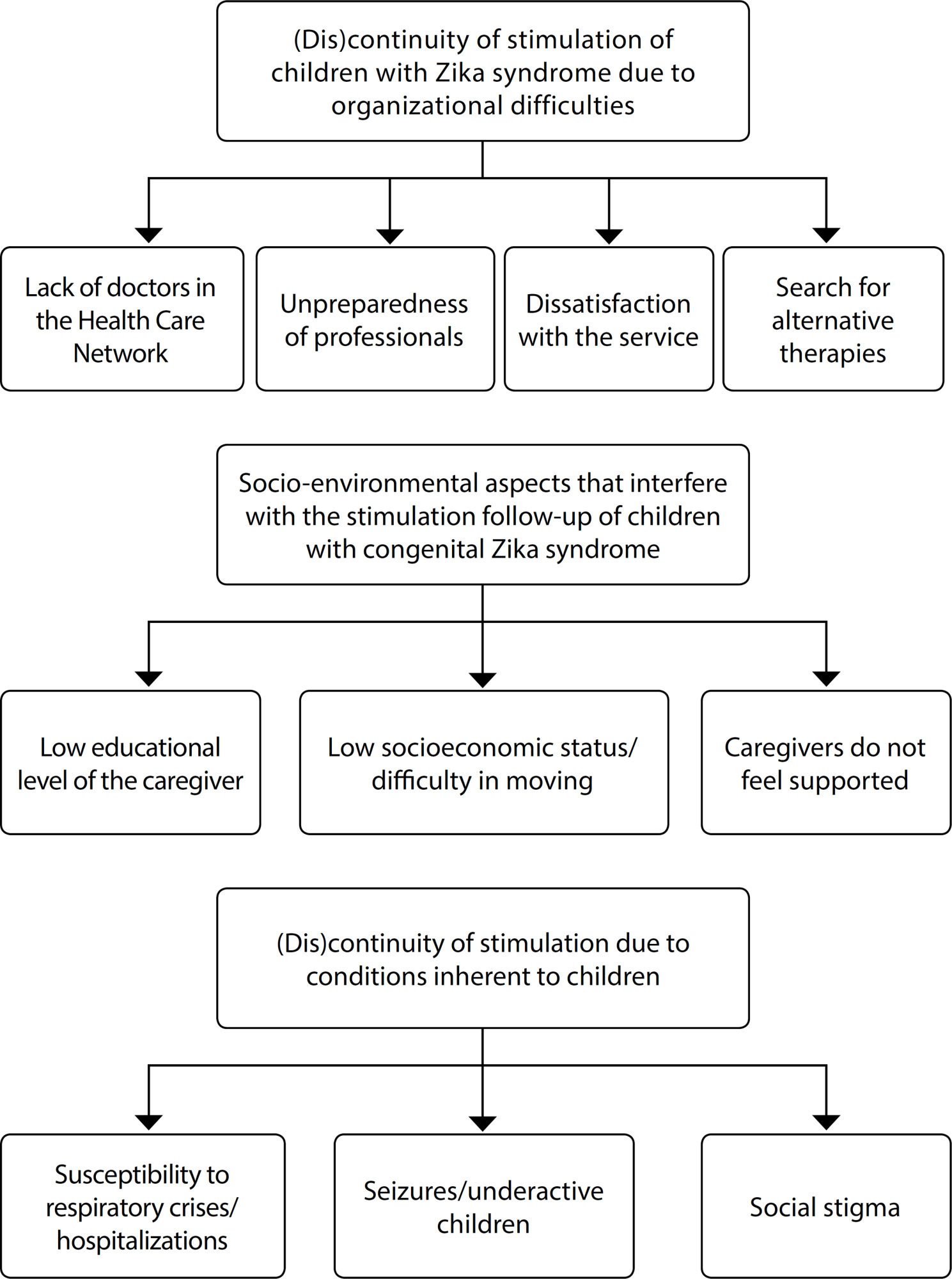
-
ORIGINAL ARTICLE08-20-2021
Risk of suicide among nursing students
Revista Brasileira de Enfermagem. 2021;74(6):e20200867
Abstract
ORIGINAL ARTICLERisk of suicide among nursing students
Revista Brasileira de Enfermagem. 2021;74(6):e20200867
DOI 10.1590/0034-7167-2020-0867
Views0See moreABSTRACT
Objectives:
to identify the risk and degree of risk of suicide in nursing students of a public institution in the countryside of Pernambuco, Brazil.
Methods:
this was a cross-sectional, quantitative research conducted with 150 students. For data collection, a sociodemographic questionnaire and the instrument, M.I.N.I. – Brazilian version 5.0.0 – Module C – Risk of suicide were used. Statistical analyses were performed with IBM(® )SPSS(®), version 23.
Results:
53.3% of nursing students had a risk of suicide, of which 20.7% had a high risk. Moreover, 22.67% reported previous suicide attempt. It is noteworthy that students without a partner have a higher risk of suicide (56.8%) than those with a partner (29.4%).
Conclusions:
it is perceived the need to develop programs that identify students at risk of suicide in higher education institutions, in order to raise awareness of the problem and implement policies to promote mental health in the academia.
-
REVIEW08-20-2021
Root Cause Analysis, Failures and Effects in pediatric total quality management: a scoping review
Revista Brasileira de Enfermagem. 2021;74(6):e20200954
Abstract
REVIEWRoot Cause Analysis, Failures and Effects in pediatric total quality management: a scoping review
Revista Brasileira de Enfermagem. 2021;74(6):e20200954
DOI 10.1590/0034-7167-2020-0954
Views0See moreABSTRACT
Objectives:
to analyze the applicability of Root Cause Analysis and Failure Mode and Effect Analysis tools, aiming to improve care in pediatric units.
Methods:
this is a scoping review carried out according to the Joanna Briggs Institute guidelines, following the Preferred Reporting Items for Systematic Reviews and Meta-Analyzes extension for Scoping Reviews. Search took place in May 2018 on 15 data sources.
Results:
search totaled 8,254 studies. After using the relevant inclusion and exclusion criteria, 15 articles were included in the review. Of these, nine were published between 2013 and 2018, 12 used Failure Mode and Effect Analysis and 11 carried out interventions to improve the quality of the processes addressed, showing good post-intervention results.
Final Considerations:
the application of the tools indicated significant changes and improvements in the services that implemented them, proving to be satisfactory for detecting opportunities for improvement, employing specific methodologies for harm reduction in pediatrics.
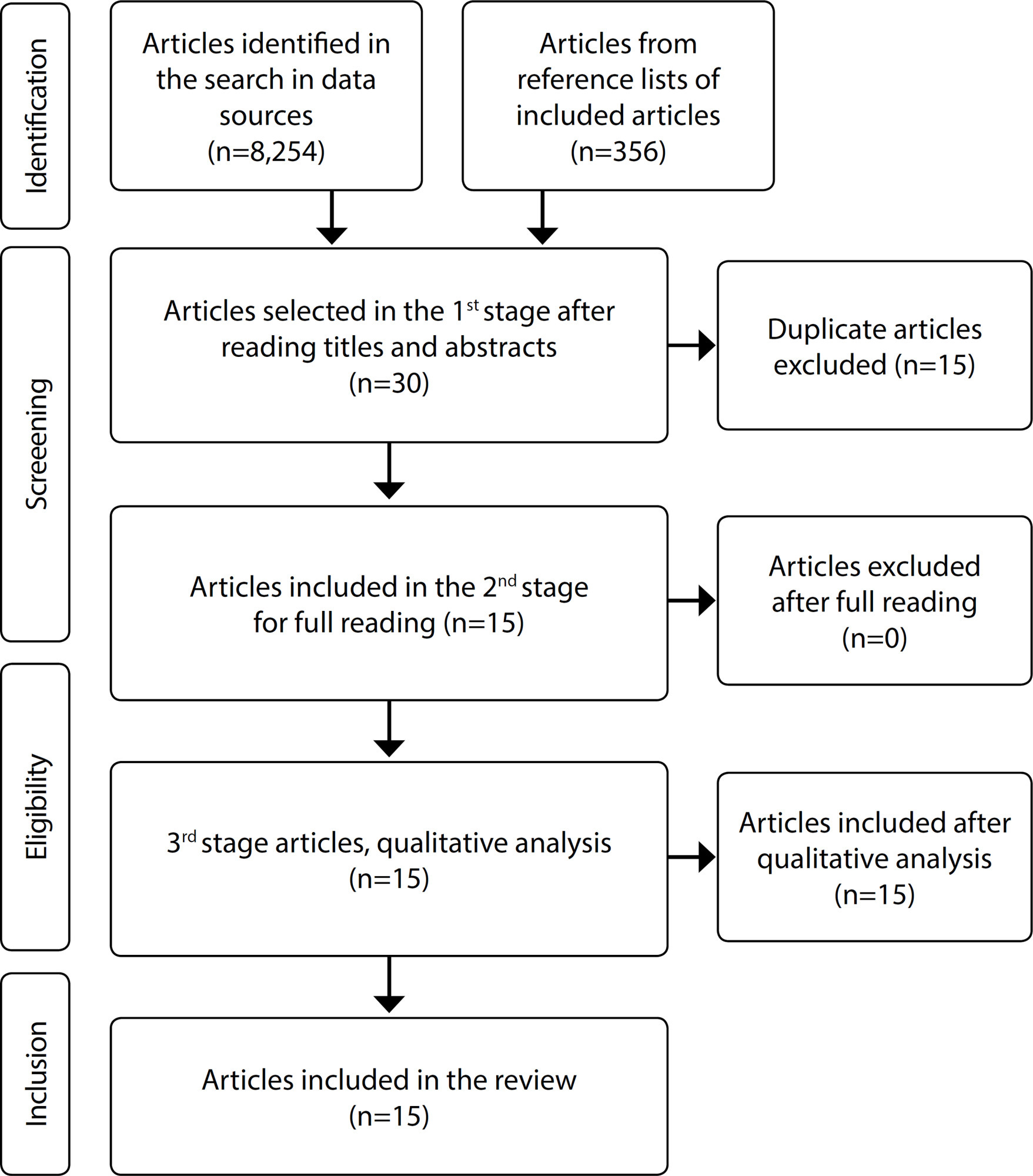
-
ORIGINAL ARTICLE07-26-2021
Representations about sexuality of people diagnosed late with HIV infection
Revista Brasileira de Enfermagem. 2021;74(6):e20201028
Abstract
ORIGINAL ARTICLERepresentations about sexuality of people diagnosed late with HIV infection
Revista Brasileira de Enfermagem. 2021;74(6):e20201028
DOI 10.1590/0034-7167-2020-1028
Views0See moreABSTRACT
Objective:
to understand the representations about sexuality of people diagnosed late with HIV infection and its implications in the delayed search for diagnosis.
Methods:
this is a qualitative study, whose theoretical and methodological framework was Social Representation Theory. The research was carried out with 18 people diagnosed late with HIV infection through an open interview. For data analysis, Structural Narration Analysis was used, with support from MAXQDA 12®.
Results:
representations about sexuality contributed to delayed diagnosis, such as trust in a fixed partnership, sexual intercourse is natural, sexuality as a taboo, search for pleasure in sexual intercourse, regardless of risks, denial of risk for HIV infection.
Final considerations:
representations about sexuality participate in a web of stereotypes and riskier ways of living, which contribute to delayed diagnosis. Sexual health education remains necessary and essential throughout people’s lives.
-
08-20-2021
Prevalence of central venous catheter salvage in newborn with staphylococcal bloodstream infection
Revista Brasileira de Enfermagem. 2021;74(6):e20201073
Abstract
Prevalence of central venous catheter salvage in newborn with staphylococcal bloodstream infection
Revista Brasileira de Enfermagem. 2021;74(6):e20201073
DOI 10.1590/0034-7167-2020-1073
Views0See moreABSTRACT
Objectives:
to establish the prevalence of salvage of central venous catheters in newborns with bloodstream infection caused by coagulase-negative staphylococci.
Methods:
retrospective cross-sectional study with 136 newborns admitted to the Neonatal Intensive Care Unit between 2011 and 2017. The total of 143 infection events undergoing antibiotic therapy were evaluated.
Results:
among the 143 infection events, 39 catheters in which antibiotic therapy was used were saved and in 69 cases, the device was removed. Positive central blood culture and single lumen catheter were factors associated with salvage failure. The probability of salvage decreased with infections diagnosed from 15 days of using the catheter. Negative blood culture raised the chance of salvage by fourfold.
Conclusions:
the use of antibiotic therapy in the treatment of infections resulted in a low prevalence of salvage of the central venous catheter. The probability of salvage was associated with variables of the device.
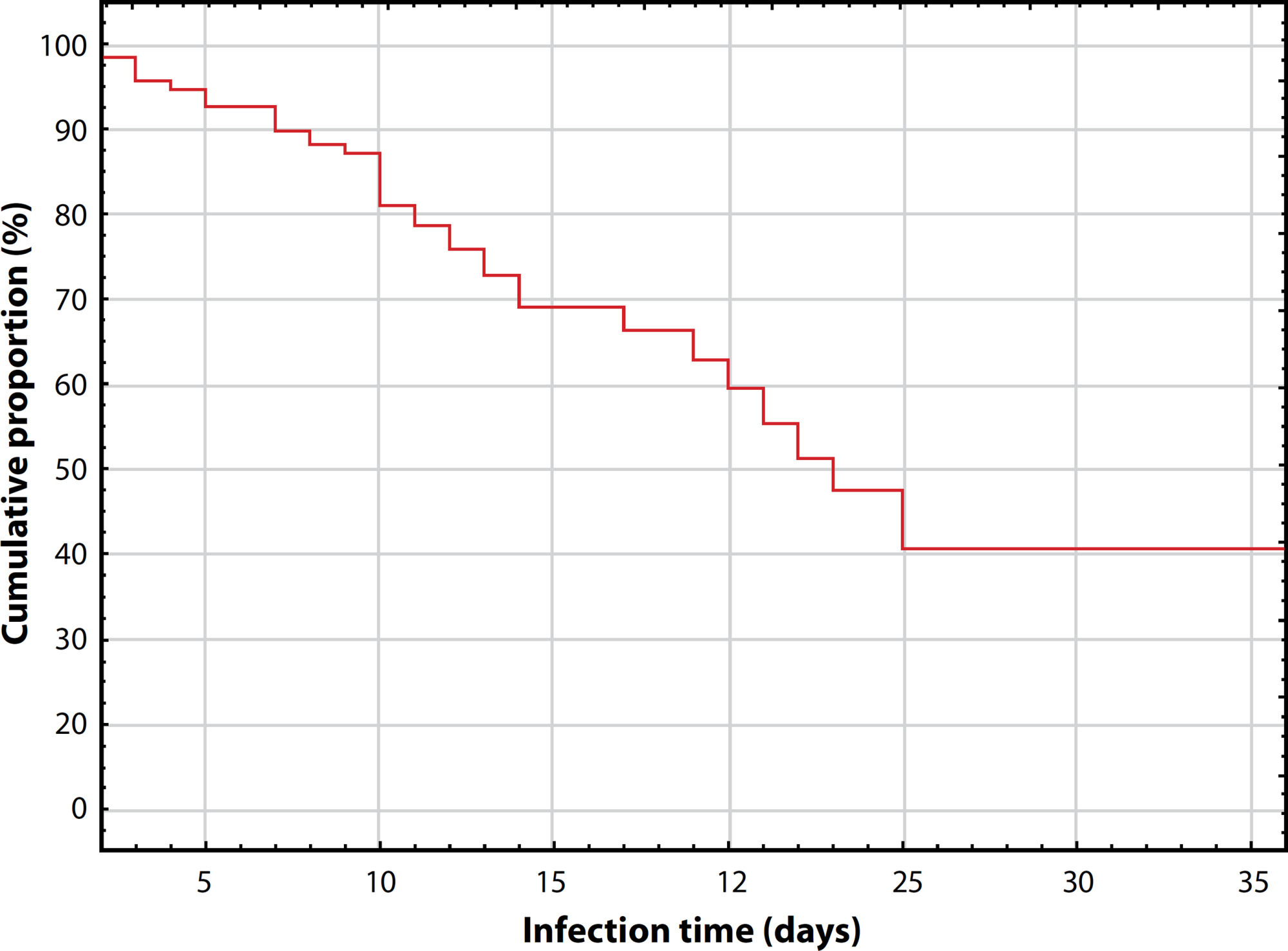
-
EXPERIENCE REPORT02-15-2021
Coronavirus infections: health care planning based on Orem’s Nursing Theory
Revista Brasileira de Enfermagem. 2021;74:e20200281
Abstract
EXPERIENCE REPORTCoronavirus infections: health care planning based on Orem’s Nursing Theory
Revista Brasileira de Enfermagem. 2021;74:e20200281
DOI 10.1590/0034-7167-2020-0281
Views0See moreABSTRACT
Objective:
to report the experience of professors and students of a graduate course on nursing care in coping with the new coronavirus (COVID-19) based on Self-Care Theory.
Method:
the active methodologies used were a literature search and seminar presentations, with an understanding of Orem’s theoretical concepts: health; man; self-care; universal, developmental and health deviation requirements; self-care activities; self-care deficits; the required therapeutic demand; nursing systems. The pandemic was considered a health deviation that requires critical thinking and nursing care planning. Methodological frameworks to classify nursing diagnoses, interventions, and outcomes were used.
Results:
for each health deviation, nursing systems were identified; self-care deficits, diagnoses; actions, interventions; and the form of assessment, outcomes.
Final considerations:
theoretical-practical reflections of the academic context support nursing care planning.
-
REFLECTION03-05-2021
Reflections on patient safety incident reporting systems
Revista Brasileira de Enfermagem. 2021;74:e20200307
Abstract
REFLECTIONReflections on patient safety incident reporting systems
Revista Brasileira de Enfermagem. 2021;74:e20200307
DOI 10.1590/0034-7167-2020-0307
Views0See moreABSTRACT
Objective:
To reflect on the main characteristics and recommendations of Incident Reporting Systems, discuss the population’s participation in reporting, and point out challenges in the Brazilian system.
Method:
Reflection study, based on Ordinance No. 529/13, which instituted the National Patient Safety Program, under Collegiate Board Resolution (CBR) No. 36/13; reflections by experts were added.
Results:
Reporting systems are a source for learning and monitoring, allow early detection of incidents, investigations and, mainly, the generation of recommendations prior to recurrences, in addition to raising information for patients and relatives. There is little participation of the population in the reporting, regardless of the type of system and characteristics such as confidentiality, anonymity, and mandatory nature.
Final Considerations:
In Brazil, although reporting is mandatory, there is an urgency to advance the involvement and participation of the population, professionals, and institutions. To simplify data entry by improving the interface and importing data from the reporting system is an objective to be achieved.
-
EXPERIENCE REPORT01-29-2021
Restructuring service at a mastology outpatient clinic during the COVID-19 pandemic
Revista Brasileira de Enfermagem. 2021;74:e20200571
Abstract
EXPERIENCE REPORTRestructuring service at a mastology outpatient clinic during the COVID-19 pandemic
Revista Brasileira de Enfermagem. 2021;74:e20200571
DOI 10.1590/0034-7167-2020-0571
Views0INTRODUCTIONCOVID-19 is a disease caused by the SARS-CoV-2 coronavirus (Severe Acute Respiratory Syndrome Coronavirus 2) and has brought a threat to public health worldwide. In need of immediate changes, adaptations tend to be the way out to avoid contamination that potentially does not distinguish race, color, gender().The global numbers of suspected and confirmed cases are […]See more
-
ORIGINAL ARTICLE07-31-2020
Pain assessment in pediatrics
Revista Brasileira de Enfermagem. 2020;73:e20190109
Abstract
ORIGINAL ARTICLEPain assessment in pediatrics
Revista Brasileira de Enfermagem. 2020;73:e20190109
DOI 10.1590/0034-7167-2019-0109
Views0See moreABSTRACT
Objectives:
to investigate how the pain assessment and management process in pediatric patients is performed and suggestions for its improvement.
Methods:
exploratory, qualitative study. Nine professionals from the nursing team of a pediatric hospital unit in Porto Alegre/RS participated in the study. A sociodemographic questionnaire and semi-structured interviews were used with content analysis.
Results:
the results reinforced the importance of pain assessment with family participation and the need to use tools and process improvements in the training and sensitization of professionals.
Final Considerations:
after the study was concluded, there was a clear need to address the issue, highlighting its relevance for pain resolution in pediatric patients.
-
03-19-2021
Validity and reliability of Kessler Psychological Distress Scale for Brazilian elderly: a cross-sectional study
Revista Brasileira de Enfermagem. 2021;74:e20200365
Abstract
Validity and reliability of Kessler Psychological Distress Scale for Brazilian elderly: a cross-sectional study
Revista Brasileira de Enfermagem. 2021;74:e20200365
DOI 10.1590/0034-7167-2020-0365
Views0See moreABSTRACT
Objective:
to verify the validity and reliability of the Psychological Distress Scale for screening mental distress.
Methods:
a cross-sectional study with 75 elderly people. Psychological Distress scale and Self Reporting Questionnaire were used. Criterion validity was verified using Spearman’s correlation and diagnostic accuracy measures. Cronbach’s alpha coefficient was used to investigate reliability.
Results:
the total internal consistency of the Psychological Distress Scale was α=0.844. Concurrent validity between this instrument and the Self Reporting Questionnaire was ρ=0.722 (p<0.001). The best cut-off point for screening mental distress among elderly people was a total score greater than 14, with sensitivity equal to 75.47% and specificity equal to 85.0%.
Conclusions:
the scale was robust for screening mental distress, given its high reliability, in terms of homogeneity, and adequate criterion validity, whose best cut-off point for screening was a score greater than 14.
-
ORIGINAL ARTICLE10-21-2019
Hand hygiene: knowledge and skill of caregivers in the hematopoietic stem cell transplantation
Revista Brasileira de Enfermagem. 2019;72(6):1653-1662
Abstract
ORIGINAL ARTICLEHand hygiene: knowledge and skill of caregivers in the hematopoietic stem cell transplantation
Revista Brasileira de Enfermagem. 2019;72(6):1653-1662
DOI 10.1590/0034-7167-2018-0788
Views0See moreABSTRACT
Objective:
to identify the knowledge and ability of caregivers on hand hygiene in hematopoietic stem cell transplantation.
Method:
a prospective cross-sectional study. A questionnaire was used to identify the knowledge and it was observed the hygiene technique performance. Data were collected in two units (autologous and allogeneic transplant).
Results:
the 37 participants recognized the importance of hand hygiene and 95.5% related to removal of dirt or infection prevention. 91.9% stated that it was important to clean their hands with soap and water when entering and leaving the room, and 64.9% understood that it was necessary to apply alcoholic solution after washing. On average, the caregivers scored 6.16 steps, when demonstrating the washing technique and 3.91 steps in the friction with alcoholic solution.
Conclusion:
although they recognize the importance of the procedure, there are deficits related to the moment and the correct way of doing it, evidencing the need for strategies aimed at improving this process.
-
EXPERIENCE REPORT07-31-2020
(In)visibility of children with special health needs and their families in primary care
Revista Brasileira de Enfermagem. 2020;73:e20190071
Abstract
EXPERIENCE REPORT(In)visibility of children with special health needs and their families in primary care
Revista Brasileira de Enfermagem. 2020;73:e20190071
DOI 10.1590/0034-7167-2019-0071
Views0See moreABSTRACT
Objectives:
to discuss the (in)visibility of children with special healthcare needs and their families in the Primary Health Care scenario.
Methods:
experience report about the difficulties faced by researchers from different regions of Brazil to locate children with special healthcare needs in the scope of primary care.
Results:
the main reason for these children and their families to be “unknown” and, therefore, not assisted in PHC, is the fact that they are followed-up by institutions/outpatient clinics and specialized and/or public rehabilitation clinics, or even because they have private health insurance.
Final Considerations:
transferring care responsibility to the Primary Health Care teams to specialized and rehabilitation institutions may be related to the lack of knowledge of the care demands of this group, as well as to the relevance of care centered on rehabilitation and the specialty instead of the long-term care, one of the features of primary health care.
-
ORIGINAL ARTICLE10-21-2019
Perception of health professionals about neonatal palliative care
Revista Brasileira de Enfermagem. 2019;72(6):1707-1714
Abstract
ORIGINAL ARTICLEPerception of health professionals about neonatal palliative care
Revista Brasileira de Enfermagem. 2019;72(6):1707-1714
DOI 10.1590/0034-7167-2018-0842
Views0See moreABSTRACT
Objective:
To identify the perception of health professionals about neonatal palliative care.
Method:
A phenomenological qualitative study, a non-probabilistic sample, of 15 health professionals from a neonatal intensive care unit in northern Portugal. Content analysis was performed.
Results:
Despite their lack of training in palliative care, the health professionals showed concern for the dignity, quality of life and comfort of the newborn and family. They expressed emotional and relational difficulties in following the trajectories of serious illness and death and in the ethical decisions regarding the end-of-life.
Conclusion:
It is emphasized that professionals are sensitive to pain and suffering and reveal dedicated and committed in the care of the newborn and family. They are available to train and embrace the current challenges posed by the constitution of pediatric palliative care teams and to help achieve an organizational culture that advances in such care.
-
ORIGINAL ARTICLE06-27-2019
Nursing diagnoses in a home-based program: cross-mapping and NANDA-I Taxonomy
Revista Brasileira de Enfermagem. 2019;72(3):584-591
Abstract
ORIGINAL ARTICLENursing diagnoses in a home-based program: cross-mapping and NANDA-I Taxonomy
Revista Brasileira de Enfermagem. 2019;72(3):584-591
DOI 10.1590/0034-7167-2018-0323
Views0See moreABSTRACT
Objective:
to identify Nursing diagnoses in patients in home care by cross-mapping terms obtained in the anamnesis and clinical examination, with NANDA-I Taxonomy.
Method:
descriptive exploratory study, transversal type, performed with 131 patients from a home health care program in northern Minas Gerais State. With the aid of an instrument based on the theoretical model of Basic Human Needs, the terms indicators of conditions that required nursing interventions were extracted. The cross-mapping of these terms was also performed with NANDA-I Taxonomy diagnoses.
Results:
378 terms and expressions referring to 49 different diagnoses were identified in 11 of the 13 domains of NANDA-I Taxonomy.
Conclusion:
the profile of identified nursing diagnoses can contribute to care management and organizational processes of nurses who provide care to patients in home care.
-
07-05-2021
Educational technology for bathing/hygiene of elders at home: contributions to career knowledge
Revista Brasileira de Enfermagem. 2021;74:e20200890
Abstract
Educational technology for bathing/hygiene of elders at home: contributions to career knowledge
Revista Brasileira de Enfermagem. 2021;74:e20200890
DOI 10.1590/0034-7167-2020-0890
Views0See moreABSTRACT
Objective:
to build and validate an educational booklet for bathing and hygiene of elders at home.
Methods:
a methodological study, developed through data collection in literature and situational diagnosis, booklet construction, material qualification through validation by expert judges (11 nurses) and target audience (30 caregivers). Data were analyzed descriptively. The minimum content validity index of 0.80 was considered.
Results:
in content and appearance validation, experts assigned Content Validity Index global of 0.92, while for assessment of the material’s suitability, the booklet was classified as “superior”, with an average of 90%. In the validation of caregivers, the overall Content Validity Index was 1.0.
Conclusion:
the booklet was successfully validated and can be considered in the context of health education and collaborate with an adequate and safe practice of bathing and hygiene of elders at home.
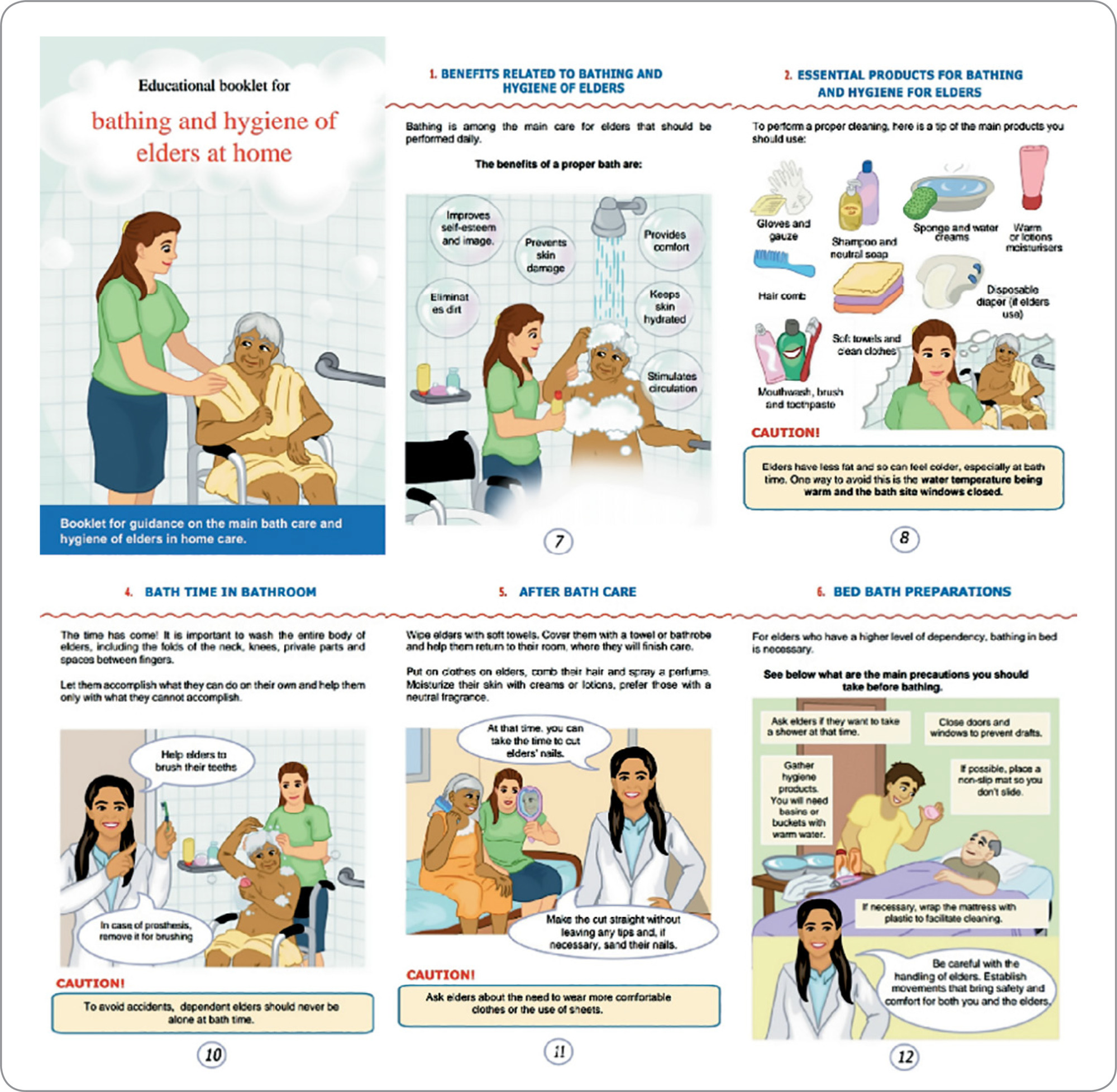
-
ORIGINAL ARTICLE12-05-2019
Quality of life, burden, family emotional support: a model for older adults who are caregivers
Revista Brasileira de Enfermagem. 2019;72:169-176
Abstract
ORIGINAL ARTICLEQuality of life, burden, family emotional support: a model for older adults who are caregivers
Revista Brasileira de Enfermagem. 2019;72:169-176
DOI 10.1590/0034-7167-2018-0439
Views0See moreABSTRACT
Objective:
To investigate associations between quality of life, sex, age, burden, and nature of emotional support available in the family in older adults who are caregivers of older relatives.
Method:
Cross-sectional and correlational study on 148 caregivers gathered in public and private healthcare services, who were subjected to psychological measures of quality of life, burden, exchange of emotional support, sex, and age. Data were analyzed using Chi-square, Fisher’s exact test and path analyses (p < 0.05).
Results:
A total of 77% women, average age of 69.7 years. There were significant associations between exchange of support and burden due to the provided assistance, being a woman and satisfaction with the received support, satisfaction with the received support and burden, burden and quality of life, and satisfaction with the received support and feeling of burden due to the provided support.
Conclusion:
Satisfaction with the received emotional support moderate the association between sex and burden, and such moderate the association between satisfaction with emotional support and perceived quality of life.
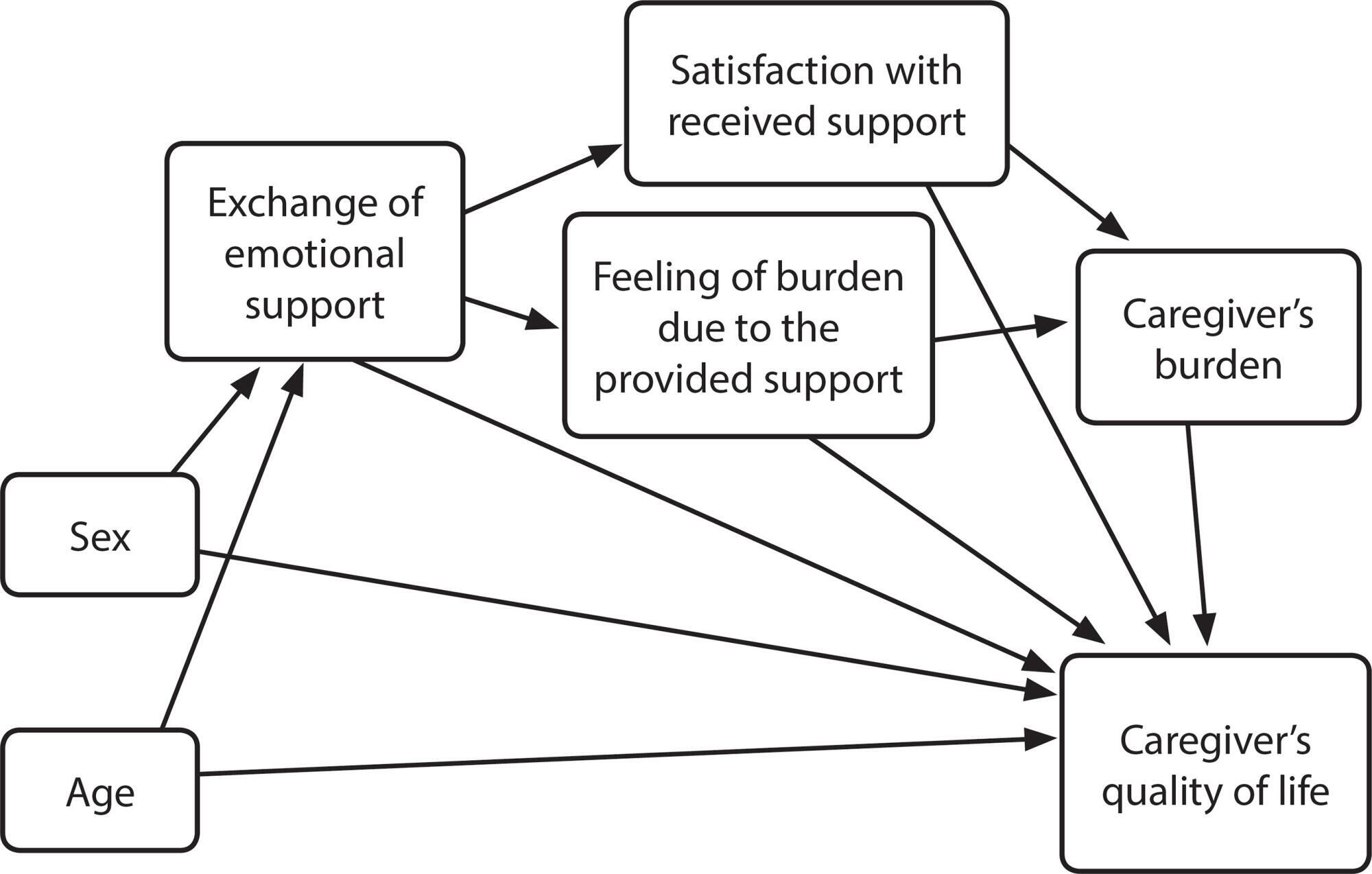
Search
Search in:
Nuvem de Tags
Adolescente (85) Atenção Primária à Saúde (239) COVID-19 (91) Criança (91) Cuidados de Enfermagem (269) Educação em Enfermagem (151) Educação em Saúde (139) Enfermagem (930) Enfermagem Pediátrica (86) Estudantes de Enfermagem (77) Estudos de Validação (131) Família (87) Idoso (208) Promoção da Saúde (99) Qualidade de Vida (104) Saúde do Trabalhador (86) Saúde Mental (145) Saúde Pública (82) Segurança do Paciente (150) Tecnologia Educacional (100)



